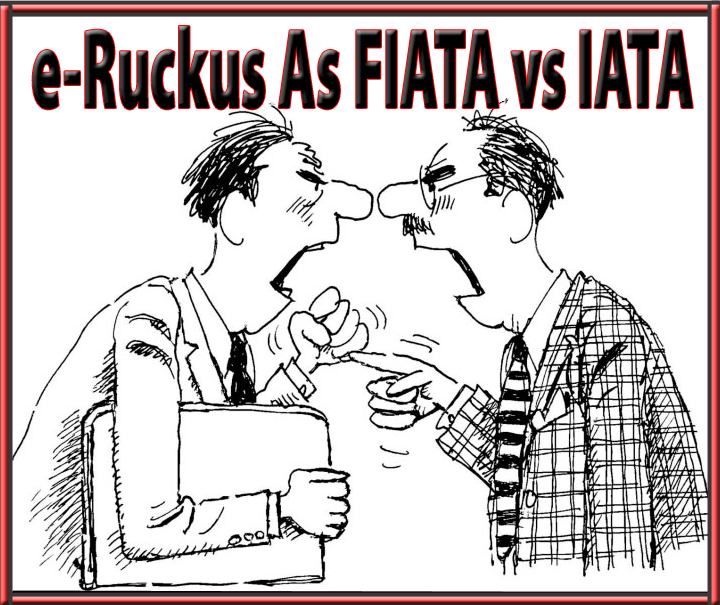e-RuckusAs FIATA vs IATA

While relations between IATA and FIATA
have been strained for over a decade, tensions may have once again reached
their boiling point.
Case in point: IATA’s recent effort
towards pushing not just the idea, but also the implementation of e-freight.
A closer look reveals that IATA has apparently failed to get one of their
most important stakeholders properly on board the e-freight bandwagon:
In a special newsletter —e-flash 81
dated September 3rd, 2014—FIATA has reached out to their members
to support FIATA’s stand against paper Air Waybill surcharges.
While FIATA makes it clear that they “support
e-Commerce and e-Air Waybill implementation in the air cargo supply chain
(and subsequently) encourage implementation, through creating value for
forwarders and carriers alike (as well as) recognizing the costs that
the originator of the information incurs, to enter and transmit data,”
they object to “the intention of air carriers to implement a Paper
Air Waybill Surcharge, for non e-AWB export shipments” and urge
“the forwarding community to voice their objection to carriers who
seek to apply yet another surcharge, and create yet another revenue stream,
under the guise of supporting IATA’s e-Freight initiative.”
In simple words, while FIATA supports the
idea and implementation of e-freight, they have no qualms saying out loud
to anyone who will listen that FIATA objects to introducing surcharges
for paper documentation.
FIATA points out that although e-freight
is on the rise—in particular on trade lanes where support by the
national governments is strong, such as the UAE (Emirates Airlines; EK),
Singapore (Singapore Airlines Cargo; SQ), and Hongkong (Cathay Pacific
Airlines; CX), it is far from being accepted everywhere.
Thus, forwarders should not be penalized
for not going electronic where electronic means of communication is either
unavailable or not permitted.
Handicapping
e-Feight Potential?
Whether or not e-freight is possible mainly depends
on the regulatory framework of the departure, transit, and destination
states permitting it, as well as forwarders and airlines having the capability
to carry out the required messaging.
But as everyone now knows so far, e-freight
implementation has seriously fallen behind the schedule IATA once envisioned.
The e-AWB agreement enacted back in 2010
that was endorsed by FIATA and adopted by the IATA Cargo Service Conference
as well as being approved by several governments—including the U.S.
DOT—was forecasted for 100% e-AWB by the end of 2014 by IATA.
IATA’s latest communications calls
for 22 percent e-freight penetration by end of 2014, while current figures
indicate falling significantly short of that modest goal.
Right now e-freight implementation stands
at slightly above 17 percent.
Even at that 17 percent figure, the situation
is not as clear as the figures seem to indicate.
The FIATA position suggests that surcharges
levied on paper documentation may not be the best way to increase the
use of e-freight and that incentives are probably a better means of achieving
a higher penetration of electronic documentation within the industry,
such as providing a discount to those forwarders who indeed offer e-freight.
Who Benefits?
Currently, e-freight is popular among the big
forwarders who realize sizeable benefits, even on the limited number of
trade lanes it is currently available, and even considering the required
investment in IT equipment and staff training.
But one issue among many that requires sorting
from both sides is how the smaller and financially-stretched members of
both IATA and FIATA can be expected to cover e-freight related investments.
Here’s an idea: Why don’t IATA,
FIATA, Global Air Cargo Advisory Group (GACAG), representatives of The
International Air Cargo Association (TIACA), and the Global Shippers’
Forum (GSF) conduct a high level meeting somewhere to advance e-freight
issues like surcharges instead of launching another battle royal in the
media?
A really good tension convention can lead
to discovering how business partners can chart a better path forward.
And yes, don’t forget the shippers.
After all, surcharges levied by carriers,
are paid by forwarders, who pass them on to shippers.
Jens/Geoffrey
|





